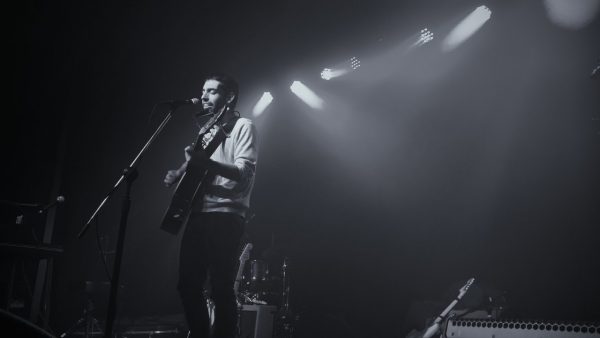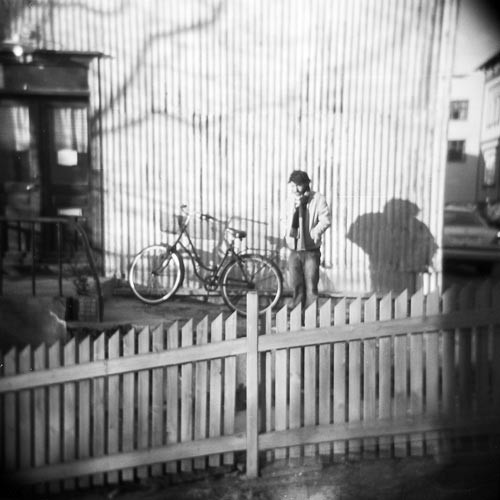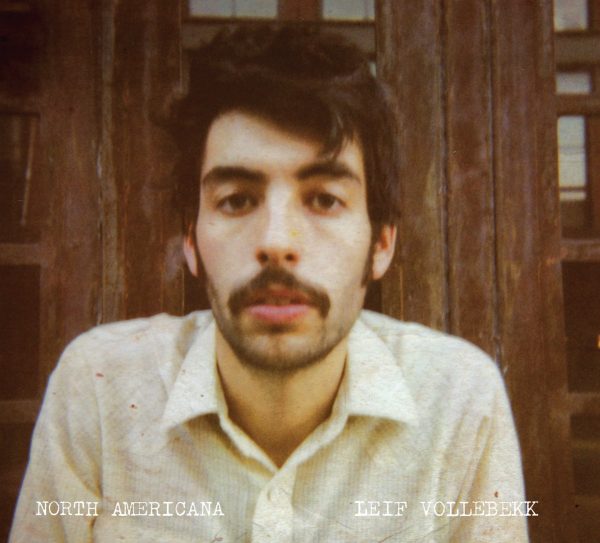
By Arran Fagan
Leif Vollebekk is an attractive man, with scruff peppered on his face like a concentration of ants on a hill, wearing his polite Canadian demeanor in his always smiling and warm-hearted eyes. On stage Leif is like a possessed apparition. With eyes clenched like fists and a jaw slack and open, he leaned over the piano, opening the Mandolin Orange Concert at the Wonder ballroom with a new song. With his head tucked down into his shoulders and body convulsing, Leif fought with and tamed the beast of his songs on stage.
Leif Vollbekk is a Montreal based singer-songwriter and musician who crafts his songs with a blend of soul, folk, rock, and jazz, seamlessly recording songs that sound fresh and balanced to a beat of poetic cadence. Vollebekk has recorded two albums: the first, Inland, is a collection of songs recorded in Iceland, and the second, North Americana, are songs recorded as live first takes in studios across Europe and North America. “Elegy”, the first single off of Vollbekk’s soon to be released album Twin Solitude, spills out as if he is writing it on the spot, an adlib from the heart loosely stitched to his sleeve. After his set at the Wonder Ballroom opening for Mandolin Orange in October of 2016, I sat down with Vollebekk to talk song writing, touring, and his new record coming out next February.
Arran Fagan: Can you talk about the new record at all?
Lief Vollbekk: I think so, why not? Let’s do it.
A bunch of the songs from tonight are on it. It’s all live to tape again, with the same idea as the last record. All of the songs were written a lot faster this time. I have written a lot of songs fast in the past, but also felt I needed to write some songs laboriously, spending months on them. I found that ever since the beginning, the ones I worked “hard on”, I always just cut from my set, and I would end up hating them, or they didn’t feel right.
AF: Do you have an example of a song that you felt like you worked “too hard” on the last record?
LV: It might be easier to say a song…
[The interview was interrupted by a woman in her mid-twenties introducing herself and thanking Leif for his music, telling him that his music helped her through one of the hardest times in her life.]
LV: Oh wow, that was really nice to hear.
AF: Does that happen a lot?
LV: No, maybe once in a blue moon, but not usually when I’m opening the show. Sitting in a corner and people coming over to say hello is really special.
AF: Earlier, we were talking about how some songs are harder to write and how you usually cut those songs out of your set. Could you elaborate on that more?
LV: I think it’s mostly that people get tired of their own songs. But the song “Off The Main Drag”, I remember writing it in about five minutes. I remember playing it for my girlfriend at the time. I played her a song with the melody and words. She said, “I don’t like it”, and my response was “You don’t like it? It’s amazing! I can’t believe you!” She responded, “I am just being honest, sorry.”
The next day I rewrote the whole thing. All the lyrics came and I didn’t change anything. It had its own rhyming scheme and one verse didn’t fit the rhyming scheme–I cut it and was done, and it took five minutes. I never really thought about it, but I just like it, and it works and still speaks to me some how.

AF: Yeah, there is a line in that song “She’s as poor as me, but she looks twice as good, I told her that because its something I would.” That’s a great line.
LV: Oh thank you, that’s so sweet.
AF: How did this album come about? Is it about anything in particular?
LV: Each song is kind of about its own thing, it doesn’t have an over arching theme. As a whole the record seems to be this more relaxed version; I feel like it’s more me than before. It isn’t trying to fit in to a genre or anything. It might have a genre but I don’t feel like it’s funky or bluesy or anything. I just feel like it sounds like me playing music and so when I play the songs it is a lot easier.
AF: Your first record “Inland” is heavily Orchestrated with a lot of moving parts, and your album “North Americana” feels more traditional. How do you produce a record? Do you let each musician play their part how they feel fit, or do you conduct the whole process?
LV: Well for instance on this last one, because it was so drum heavy, I would just play the keyboard, piano and be like “this is how it feels.” Then the drummer would play a beat, and usually it would be the right one. I would say, “No cymbals,” or “Not the snare but the rimshot,” or “emphasize this beat,” and they would go “oh ok.” That was only when they don’t get it the first try and usually they just get it on the first try. It was a lot of that, me just sharing the song saying “It feels like this” and they would do it and I would go “oh that’s it!” and then we would do a take.
And with the bass: I got this bass player called Shahzad Ismaily, he plays with Sam Amidon sometimes, and he plays with Yoko Ono too. He is this New York dude who is really deep and really good. It was amazing playing with him because I remember seeing him play with this singer from Africa, and he was just playing one note the whole time and it was perfect. That is just how my music is, it’s just one or two chords, but he was very present, and you can’t fake that because you’re playing one note the whole show and most people would be bored! But he loved playing that one note because his philosophy was that it wasn’t about the note but about the feeling. So I asked him to play on the record, which was super fun because in the hour we first met he told me that he wanted to watch me play for at least ten minutes. I played and he just watched. He then played a note and after that he always knew what to play. He was heavy, looking at my left hand and would anticipate what to play; everything he did was perfect.
New York dude who is really deep and really good. It was amazing playing with him because I remember seeing him play with this singer from Africa, and he was just playing one note the whole time and it was perfect. That is just how my music is, it’s just one or two chords, but he was very present, and you can’t fake that because you’re playing one note the whole show and most people would be bored! But he loved playing that one note because his philosophy was that it wasn’t about the note but about the feeling. So I asked him to play on the record, which was super fun because in the hour we first met he told me that he wanted to watch me play for at least ten minutes. I played and he just watched. He then played a note and after that he always knew what to play. He was heavy, looking at my left hand and would anticipate what to play; everything he did was perfect.
AF: After watching you on stage, it seems like no one would ever know when you were going to play a note.
LV: Yeah, he was good, and what’s weird about the hesitation is that with the drum and bass, when they are pinning it, I am playing off of them so they just need to be locked in. They don’t necessarily need to know exactly what I am going to do, they just need to groove with the beat, which is something I have never had before. On previous records with the band I would always do 6/8. For some reason I didn’t know how to do 4/4, just a straight beat, it just never felt right. 6/8 is circular and stretchy; you have a lot of time, with three beats instead of two when you come back down.
AF: And so from your records to your live shows there is a completely different experience and feel. Your beat, tone, and even phrasing are different. Do you do this on purpose?

LV: No, I just feel it every time. It’s weird because the only time I ever played the song the way that I played it on the record was when it was recorded that one time. It is nice to record a song when it is still fresh because then you have an interesting energy to it. And so the way the live songs are is just how I feel it now. I don’t feel time the same way as I did the first time I played it. I am not trying to change it–the song has always been the same–I just always play it slightly differently. I think it is annoying for some people because they want to hear a certain thing, but I can’t do the record thing most of the time. But that’s how it goes.
AF: So when you sit down and try to write a song, do you write every day? Do you wait until you feel like you need to write? What is your process?
LV: I was in a period when I wasn’t writing, or at least I thought I wasn’t writing. Just that I thought what I was writing wasn’t good. For a while I started writing show tunes, I wrote a small five song Broadway musical. That’s just how the songs were coming. They had these characters and it was really weird. I was like “What the hell are these songs.” I still haven’t used them for anything but they were me. I think it is bad habit that I picked up somewhere, but while writing a song I would go “Oh this isn’t me” or “I see where this is going” or “I’m smarter than this” and I would start honing in the song and that’s when the song would get contrived. There was a bit of sitting around waiting for stuff to happen, but I realized that if you stay busy, your subconscious tends to have a lot to say, and then writing it down before that part of your brain kicks in that goes “what’s this song about? This doesn’t make sense, where is the narrative? Where is the imagery?” And you know you don’t know what the images are going to be–just write it and find out. Maybe you will learn something about yourself because you are not trying too hard. When you hear a song where the chorus is supposed to be there or the lyrics are perfect, they don’t sound genuine.
AF: It seems like you are only stuck on yourself and not “what will work”. That sounds like a very good thing.
LV: When I was younger I didn’t get jealous, but I think I would look at someone and go, “How come they are doing so well, that sounds kind of fake?” At one point I realized that it doesn’t matter, who cares, good for them.
But also the thought of, “Well if you are so smart, why don’t you write a song like that?” Answer one is, “You can’t;” two is that you would have to go up there and play that song every night. What a raw deal if you write a song just to please people and it does well, but then you still have to go play it every night. If you don’t like it then that sucks–man what a raw deal that would be. I realized that I better play stuff that I feel so that if people like it then I can play it, and if they don’t like it then at least I am playing something that I like.
AF: Do you ever build your set off of what you think the audience is going to like?

LV: Playing as an opener is weird–they are tricky because you have about forty minutes and are trying to get something across, conveying some sort of shape to your set, and also trying to convince somebody to listen. Tonight people were talking a little bit and then they started listening and that was good. When I play my own full sets I just try and figure out what works. Sometimes there are magic combinations where a song will open things up and the next song makes people listen. I have a bunch of new song and I will have to record them now before I forget what they are about. Eventually I will hate them so I have to record them soon!
AF: What are your goals as a musician?
LV: I just want to be good. I just want to be good and get better, I just turned thirty and I think I got a bit lazy in my twenties, thinking that I didn’t have to practice, like strumming the guitar. You don’t really need to practice strumming the guitar. You should, but it isn’t an exciting thing to do. I realized that all of these songs that I love didn’t come out in my music and was jealous of seeing the Killers play or Ray Charles play. I wished my music was like that, or as fun to play.
So I was like “What the hell am I doing? Why isn’t my music fun to play? Why would you write a song that you don’t have fun while playing?” Shit, if all I like is playing Ray Charles covers then I should do that for the rest of my life instead of writing songs that aren’t as fun to play. Last year I was playing about two hours a day on the piano. I would just get up and play piano because I could. It was really great because I learned how to play piano. The goal is just to get better–it doesn’t have to do with anything.
I just want to be as present as possible, it is a challenge but it’s a lot of fun.
Volbekk’s new album comes out Feburary 24th out of Secret City records.